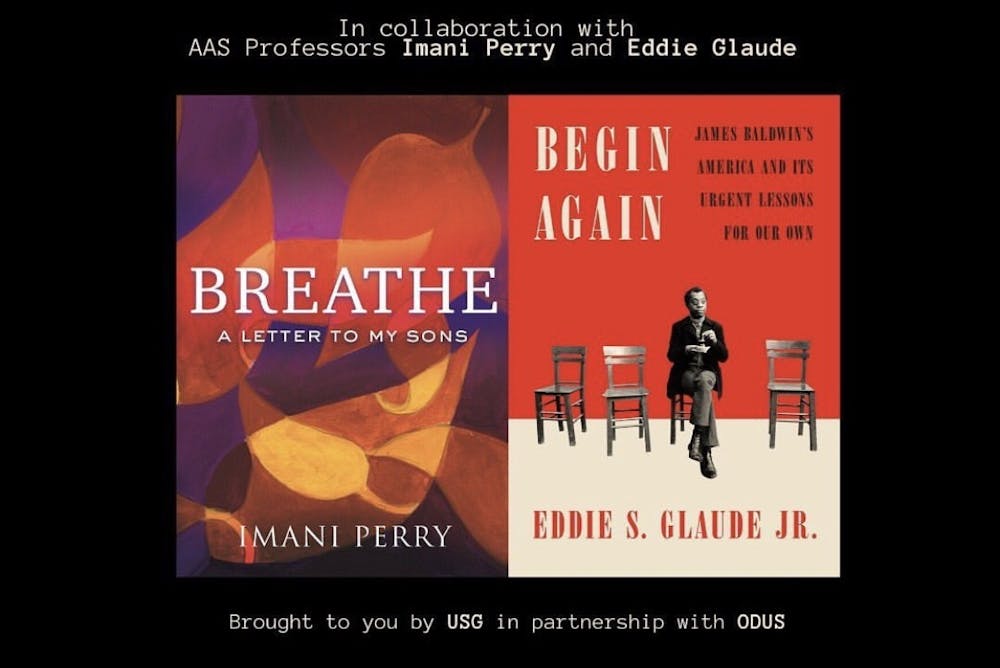On June 25, the Undergraduate Student Government (USG) announced its Anti-Racism Book Initiative, aimed at providing members of the student body a free digital copy of texts by professors in the African American Studies (AAS) department “in a collective effort to educate ourselves as a student body.”
Students submitted Google Forms indicating their reading selection. They could choose between “Breathe: A Letter to My Sons” by Hughes-Rogers Professor of AAS Imani Perry or AAS Chair Eddie Glaude’s “Begin Again: James Baldwin’s America and Its Urgent Lessons for Our Own.” Both professors will be co-teaching AAS 201: African American Studies and the Philosophy of Race in the fall and have agreed to host a book talk on their respective books in August according to the announcement.
“At an academic institution, it’s really important that education is a part of our journey to become anti-racist,” USG treasurer Rachel Hazan ’21 said in an interview with The Daily Princetonian. “I think it's really cool to be able to have the opportunity to do so alongside the student body and be able to form book clubs with your friends when the text is provided for you so that cost isn't an obstacle, ensuring that everyone can be having these conversations together.”
Hazan explained this initiative came out of a conversation between her and Deputy Dean of Undergraduate Students Thomas Dunne and grew with the help of other USG members, including USG President Chitra Parikh ’21, Projects Board Co-chair Kavya Chaturvedi ’21, and Mental Health Task Force member Taryn Sebba ’23.
Hazan told the ‘Prince’ that USG is ordering 645 total copies of each title at about $11 per book — anticipating a total cost of over $14,000. According to Hazan, USG’s surplus of funds at the end of the spring was larger than usual due to canceled programs, including Lawnparties, enabling it to contribute $10,000 to the project.
The Office of the Dean of Undergraduate Students is contributing another $2,500, and Hazan noted that because final participation numbers exceeded USG’s initial predictions, they are “reaching out to other campus partners to help close the small gap.”
The two specific books were chosen after receiving feedback and insight from African American Studies concentrators Ashley Hodges ’21, Lauren Johnson ’21, Masha Miura ’21, and Erica Dugué ’21, according to the announcement.
“We thought it was especially important to elevate voices of the members of our community as we come together as a community to learn about these issues,” Hazan said. “Offering both of [the professors’] books would be a way to maximize the impact of the initiative.”

USG also hopes to encourage engagement through coursework, highlighting a comprehensive list of fall courses surrounding race and identity compiled by Taylor A. Jean-Jacques ’20 and an Anti-Racist Reading List created by Hodges and Johnson.
Jean-Jacques is a former Business Manager for the ‘Prince.’
In their announcement, USG also stressed that simply reading one book will not solve racial injustices, but rather serve as a “starting point.”
“The process of learning and unlearning is ongoing and imperative to combating the systemic oppression of Black people,” USG leadership wrote in an email to the student body. “While we all read and discuss this book together, we also urge you to continue to vote, protest, contact elected officials, have difficult conversations with friends and family about race, donate to organizations that are fighting systemic racism, support Black-owned businesses, and continue taking action in any other ways that you are able.”

Parikh added in an email to the ‘Prince’ that USG plans to be active in ongoing discussions surrounding what the University can do to combat racism.
“We plan to advocate for Princeton-specific actions to address racism to be an agenda item at a Council of the Princeton University Community (CPUC) meeting so that all members of the Princeton community, especially students, can provide their input to the administrators, faculty, and other members of the CPUC,” Parikh wrote in an email to the ‘Prince.’
Professors Glaude and Perry did not respond to requests for comments by the time of publication.








